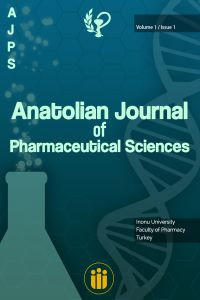Letter to editor
Research Articles
Reviews
Issue Editorial Board





Aim & Scope
Anatolian Journal of Pharmaceutical Sciences publishes original research articles, review articles, short communications, case reports, and letters to the Editor in the pharmaceutical sciences with innovative and scientific quality. Anadolu Journal of Pharmaceutical Sciences aims to publish studies on all fields of pharmacy that include new and original approaches.
Anatolian Journal of Pharmaceutical Sciences was published in 2022 and will be published online 3 times a year. This is a free, open access, and peer-reviewed journal that has an international scope in the field of pharmacy and pharmaceutical sciences. The journal only accepts studies submitted in English. All articles submitted to the journal will be peer-reviewed by experts in their fields. Information about the preparation and uploading of the articles to the system is given in detail in the "Information to Authors" section on our website.
All published articles in the journal are available online. All manuscripts must be uploaded via the online application system. Anatolian Journal of Pharmaceutical Sciences does not charge any fee during application or publication. Submitted studies must not have been previously submitted to or published in any journal.
Anatolian Journal of Pharmaceutical Sciences accepts work in the following areas:
• Drug delivery Systems
• Biotechnological drugs
• Drug substances from natural origin
• Pharmacokinetics of drugs
• Drug synthesis
• Analyses methods of drugs
• Pharmacological effects and toxicology of drugs
• Development of drug formulations
• Clinical pharmacy
• Microbiological drug discovery
• Complementary medicine
• Education in Pharmacy and deontology
• Basic medicinal sciences like biochemistry, physiology, histology.
• Multidisciplinary studies related to the above study fields
Author Guidelines
Writing Rules
a. Articles should be prepared in Microsoft Word with a margin of 2 cm from the bottom, top, right, and left. Line spacing should be 1.5 and Times New Roman font should be used in writing. All articles should include title, author names, abstract, conflict of interest, and author contribution statement.
b. The abbreviations used in the article should be defined at their first mention, then the abbreviated forms should be used. The use of abbreviations in the title should be avoided as much as possible.
c. Full-text articles should include a title (English), abstract (English), minimum 3 keywords (English), introduction, materials and methods, results, discussion, acknowledgment (if any), conflict of interest, and references.
d. The title of the article should be centered, with a font size of 14 points, with the first letter of each word capitalized and in bold letters. Author names and surnames should be centered, names should be written in lowercase (initial capital letters) and surnames should be written in capital letters in 12 points. The institutions where the authors work, their communication addresses, and ORCID numbers should be written in 10 points. An asterisk should be added next to the name of the corresponding author and the corresponding author's name/surname, telephone number, and e-mail address should be specified and written in 10 font size.
e. Abstract; should consist minimum of 100 and a maximum of 250 words for research articles and reviews, and a minimum of 100 and a maximum of 150 words for case reports and short articles with 12 points.
f. Keywords; should be given in Turkish after the Turkish abstract, and in English after the English abstract, with one line space left. At least 3, at most 6 keywords describing the work should be used, in 12 points, separated by a comma, and written in lowercase letters.
g. Main and sub-headings in the text; should be numbered, left-aligned, in 12 points and bold letters. Main headings should be written in capital letters and subheadings should be written with only the first letter of each words capitalized. The main text should be arranged in two columns.
h. In the “Materials and Methods” section, the name of the institution and the ethics committee approval number for animal experiments and clinical studies. The herbarium address and number for herbal materials, and the name and surname of the person who made the diagnosis should be given.
i. Figures, Tables, and Formulas should be numbered in the text. Figure names should start with “Figure 1.”, written in 12 points, aligned to the left under the figure. Table titles should start with “Table 1.”, written in 12 points, above the table, aligned to the left. The texts in the table should not be smaller than 9 points. Figures, photographs, and graphics; The article should be uploaded to the system as separate files, in TIFF or JPEG formats with a minimum resolution of 300 dpi. When there is more than one sub-figure within a shape, each of them (such as a, b, c) should be named separately.
j. In the “Conflict of Interest” section, if there is no conflict of interest, the “Authors declare that there is no conflict of interest.” statement should be included.
k. References should be given at the end of the text in the order of their appearance in the text. Reference numbers are given at the end of the sentence using square brackets [1], [3], [5], etc. should be shown in numbers. The EndNote style available on our website can be used for the bibliography.
Examples for Writing References
For research articles:
[5] Tekdemir O, Özsoy Y. Veteriner alanda kullanılan modifiye salımlı dozaj şekilleri. Türk Farmakope Dergisi. 2020; 5(2): 25-36.
For book chapters:
[6] Şenel S, Vural İ. Farmasötik Su. In: Zırh Gürsoy A (ed). Farmasötik Teknoloji. 2inci baskı. İstanbul: Aktif Matbaa ve Reklam Hizmetleri San. Tic. Ltd. Şti, 2012: 137-146. [ISBN 975- 97725-1-5].
For proceedings:
[7] Gecim M, Beceren A, Aydemir S, Sardas S. Evaluation of incision wound healing activity of Scorzonera veratrifolia in Wistar albino rats. 53rd Congress of the European Societies of Toxicology (EUROTOX), 10-13 September 2017, Bratislava, Slovakia. Abs. Book, 280.
For thesis:
[8] Özdemirhan ME. Agomelatinin sıvı kromatografi yöntemi kullanılarak tabletlerden analizi. Yüksek Lisans Tezi, Anadolu Üniversitesi, Sağlık Bilimleri Enstitüsü, Eskişehir, 2013.
For URL:
[9] Webber S. (2008, 10 Ekim). Information literacy in workplace contexts. reached http://information-literacy.blogspot. com/22 October 2008.
Ethical Principles and Publication Policy
Ethical Principles and Publication Policy
Anatolian Journal of Pharmaceutical Sciences publishes articles in accordance with the principles and guidelines announced on the websites of the International Council of Medical Journal Editors (ICMJE), World Medical Editors Association (WAME) and Publication Ethics Rules (COPE). Articles submitted to our journal must be original works that have not been fully or partially published anywhere before. All stakeholders involved in a scientific study must act within the scope of ethical principles.
Some of the situations that are considered to be against scientific research and publication ethics are given below:
Plagiarism: Plagiarism is presenting the original ideas, methods, data or works of others as one's own work, in whole or in part, without attribution in accordance with scientific rules.
Articles with a similarity rate of more than 25% are considered plagiarism and are returned back to authors without further evaluation. All submissions are screened by a similarity detection software (iThenticate) and the similarity report are uploaded to the system by the responsible author.
Fraud: Data fraud is defined as the use of non-existent or altered data in scientific study.
Distortion: Changing research records or data obtained, showing devices or materials that are not used in the research as if they were used, changing or shaping research results in line with the interests of the people and organizations that are supported are considered within the scope of distortion.
Republishing: Presenting the same publication as separate publications without citing previous publications is considered within the scope of publication repetition. All responsibility for the publications submitted for evaluation to be published elsewhere or in the process of evaluation belongs to the authors.
Slicing: Separating the results of a research in a way that violates the integrity of the research and inappropriately and publishing it in more than one issue and presenting these publications as separate publications is considered as slicing.
Unfair authorship: It is considered unfair authorship to include people who do not have active contributions among the authors or not to include those who contribute, to change the order of authors unjustifiably and inappropriately, to include their name among the authors by using their influence even though they do not have an active contribution. All authors must have contributed adequately to the planning, design, data collection, analysis, evaluation, preparation of the research for publication and the presentation of the final version of the research. Those who do not meet the criteria for authorship but contribute to the study should be included in the acknowledgment section.
PUBLICATION POLICY
Anatolian Journal of Pharmaceutical Sciences is an open access peer-reviewed journal in which original research articles, reviews, short communication, letters to the editor and case report in the field of pharmaceutical sciences are published. Articles are subject to editorial review and are evaluated by at least two independent reviewers.
The preliminary assessment of the articles submitted to the journal is reviewed by the technical editor in terms of compliance with the journal's writing rules and sent return back to the author for corrections. The author has a maximum of one month to make revisions. Afterwards, the articles coming to the journal are read by the editor and directed to the relevant field editor. If the field editor finds the article suitable for evaluation, it directs it to the referees. The pre-evaluation phase was determined as 10 days by the editor and the referee evaluation process was determined as 6 weeks. The next process proceeds in the form of correspondence between the field editor, referees and the author, and the final decision is made for the article within a maximum of 2 (two) months after the referee's opinions and necessary correspondence are completed. Correspondence regarding the evaluation of the article is made only with the responsible author. After the publication is accepted, the order of the authors in the study is not modified.
COPYRIGHT
The journal owns the copyright of all published articles. Statements and opinions expressed in the published material herein are those of the authors. Manuscript writers are not paid by any means for their manuscript. All manuscripts published must be accompanied by the “Copyright Release Form” that is available on the journal web site.
ETHICAL RESPONSIBILITIES OF AUTHORS
In clinical studies using human and human biological material, an informed consent form must be obtained, and the material must be specified in the method section. For studies conducted with volunteers, a written informed consared in accordance with the research protocol should be obtained. All research studies on humans must have been performed in accordance with the Principles of the Declaration of Helsinki. In the presence of such studies, the authors are expected to include the date and number of the report they received from the ethics committee of their institution, that they carried out the study following these principles in the material and method section of the article.
In studies using animals, the authors should state that they protect animal rights in their studies in line with the Guide for the Care and Use of Laboratory Animals principles and that they have received approval from the ethics committee of the institution where the research was conducted. In the material and method section of the article, they are expected to include the date and number of the report they received from the ethics committee of the institution they conducted the study in accordance with these principles.
Ethics committee approval is required when human cells are extracted and employed in cell culture investigations. Studies using commercially available continuous cell cultures, on the other hand, do not require ethics committee permission.
In the case of the use of creatures (such as marine fungi) whose species identifications are provided by gene sequencing in the context of pharmacognosy and natural sciences, these species should be registered in the GenBank database at NCBI (National Center for Biotechnology Information) along with their gene sequence information and then the registration number should also be reported in the article.
The corresponding author is the author who is in contact with the journal about the publication and is responsible for informing the co-authors. The corresponding author should verify that all authors accept the order of authors, check all necessary information and regulations before submitting the publication to the journal, and keep in touch with the journal during publication. Authors should make sure that the studies they submit are completely original. In the publications, the opinions, comments, and findings of other studies should be quoted accurately and completely. If necessary, permission must be sought by the authors in accordance with copyright law for other people's material such as scale, questionnaire, and images. All authors are responsible for the data and results specified in the publication. If there is a financial relationship or conflict of interest between the authors that may affect the results of the research or scientific publication, it should be declared.
Authors may be asked to transmit the raw data regarding their works to the editorial board while the referee is in the process, in that case the authors should share their raw data with the editorial board. When the authors determine a mistake in their work, they should inform the editor and the editorial board and cooperate for the correction or withdrawal process. The authors are obliged to respond to the criticisms made by the referees through the corresponding author and make the necessary changes. If the requested changes are not approved by the authors, the reason should be explained.
ETHICAL RESPONSIBILITIES OF THE REFEREES
Anatolian Journal of Pharmaceutical Sciences completes the article evaluation process according to the principle of two-way blind refereeing, in which the referees and authors do not know each other mutually. Referees cannot communicate directly with authors; they submit the requested corrections to the authors via the article evaluation form or the article text through the editors.
The referees who will evaluate the articles whose applications are accepted to the Anatolian Journal of Pharmaceutical Sciences should have the following ethical responsibilities;
Referees should evaluate within the framework of impartiality and confidentiality rules. The article should not be copied or stored. Referees should only evaluate articles that are suitable for their field of expertise and give timely acceptance/rejection responses. It should make evaluations to improve the quality of the work and make constructive suggestions for revision. Referees should make their evaluations in constructive and polite language, following academic etiquette. Personal insults and hostile comments should be avoided. When they realize a conflict of interest, they should refuse to evaluate the article and inform the journal editor.
ETHICAL RESPONSIBILITIES OF EDITOR
Editors are responsible for reviewing all articles submitted to the journal, presenting them to the referees, determining the acceptance/rejection status and selecting the referees transparently considering their study subjects. The editor may consult the members of the editorial board or the referees when making a decision. Editors must ensure that the publication evaluation process is fair, impartial, and timely. In addition, the editor has to know and report any conflict of interest that may arise. If the editor detects errors in an article before publication, it should be corrected. If errors are detected later, they should publish the corrected version of the article. All correction or retraction notices must be prominently published in the journal. Articles are evaluated according to their scientific content, regardless of the authors' race, gender, sexual orientation, belief, ethnicity, citizenship, or political views. The editor should keep privileged information or ideas in unpublished articles confidential and not use them for personal purposes. The referees suggested by the author in the article application should be taken into account. However, the referee's preferences are at the discretion of the editor. If a submitted article is rejected, the editor must deal fairly with the author's objection.
Price Policy
Fee Policy
All expenses of the journal are covered by the Faculty of Pharmacy of Inonu University. There is no article submission and publishing fee for submitted or accepted articles.
Content of this journal is licensed under a Creative Commons Attribution-NonCommercial 4.0 International License.







